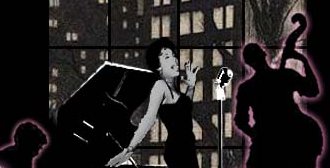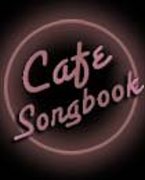Welcome toCafe SongbookInternet Home of the |
 |
 |
| Home || Songs || Songwriters || Performers || Articles and Blogs || Glossary || About Cafe Songbook || Contact/Submit Comment | |
| Search Tips: 1) Click "Find on This Page" button to activate page search box. 2) When searching for a name (e.g. a songwriter), enter last name only. 3) When searching for a song title on the catalog page, omit an initial "The" or "A". 4) more search tips. | |
Sammy Fain |
||||
|
Basic InformationBorn: Samuel Feinberg, June 17, 1902, New York City Died: December 6, 1989 (age 87), Los Angeles, California Primary songwriting role: composer; also lyricist, musician, and music publisher Co-writers: frequently Irving Kahal, Victor Young, Paul Francis Webster, Yip Harburg, Lew Brown, Jack Yellen, Sammy Cahn, Bob HIlliard, Mitchell Parish, and Henry Mancini. Also view a database of 40 Sammy Fain co-writers. |
|||
Overview and Commentary: |
|
Sammy Fain
|
Sammy Fain epitomizes the American songwriter of first half of the 20th century in terms of versatility, writing songs for Tin Pan Alley publishers, Broadway shows and Hollywood movies, most often writing the music, sometimes the words and not that infrequently, both. He began publishing his work in the 1920s and continued into the 1970s. His most well known songs range from standards such as "I'll Be Seeing You" (1938) to smash hits limited in their popularity to a partiular time such as "Love Is a Many Splendored Thing" (1955). Fain's route into the songwriting business was not unique. Like Irving Berlin and Harold Arlen, his father was a cantor. And like Berlin, George Gershwin and others, he got his start working at a Tin Pan Alley publishing house, Mills Music, as a staff pianist. His training for this was having taught himself how to play. His first success was "Nobody Knows What a Red Head Mamma Can Do" with lyrics by Al Dubin (1924) with lyrics by Al Dubin and Irving Mills. By the time he wrote the music for "Wedding Bells Are Breaking Up That Old Gang of Mine" (words by Irving Kahal and Willie Raskin) in 1929, his reputation had been made. The timing was good because it was at that time that the demand for songwriters for Hollywood musicals were in demand and an early suuccess was "You Brought a New Kind of Love to Me, for which he wrote the music with Pierre Norman. The song was created for the movie "The Big Pond" and had lyrics by Kahal. That song was followed by another written for a movie, "A New Kind of Love" with words by Joe Young and recorded and made popular by Guy Lombardo in 1931. The thirties saw several more hits, 1937 yielding two more standards written for films: "That Old Feeling" with a lyric by Lew Brown, introduced by Virginia Verrill in Vogues of 1938, and "I Dream, Can't I?" with words by Kahal, sung by Tamara in Right This Way. "Are You Having Any Fun" brought about a return to Broadway with "Are You Having Any Fun," lyricist Jack Yellen, which was sung by Ella Logan in George White's Scandals of 1939 as well as becoming a hit record for her. The forties began with a revival of "I'll Be Seeing You," becasue of its resonance for soldiers who were leaving for overseas and their wives and sweehearts at home. The decade ended with a huge hit for Fain and Bob Hilliard, "Dear Hearts and Gentle People" in 1949, which was recorded by Dinah Shore and Bing Crosby among others. The fifties continued the parade of hits for Fain with "Secret Love" (lyrics by Paul Francis Webster) made for the movie Calamity Jane for which it won Fain his first Oscar. The biggest recording was, of course, by Doris Day. Fain's second Oscar came in 1955 for "Love Is a Many Splendored Thing," the title song for the movie, again with lyric by Webster. Other Webster collaborations included "April Love" (1957), " A Certain Smile" 1958, and "Tender Is the Night" (1961). Fain was inducted into the Songwriters Hall of Fame in 1972., some seventeen years before his death in 1989.
|
| back to top of page | |
Cafe Songbook |
|||
Peter Mintun comments on and performs the 1937 song "Our Penthouse on Third Avenue" with music by Sammy Fain and words by Lew Brown from the film New Faces of 1937. Mintun explains how much the Manhattan neighborhood described in the song has changed from 1937 to the 21st century. |
"Secret Love" on Clasical Guitar Swedish guitarist Martin Fogel plays Sammy Fain's 1953 Academy Award winning melody "Secret Love" from the Movie Calamity Jane, arranged by Japanese composer Toru Takemitsu. |
||
|
"The King Who Couldn't Dance" (The Worry Song) from Anchors Aweigh: composer, Sammy Fain; lyricist, Ralph Freed;. Performers: Gene Kelly and Jerry the Mouse (voice of Sara Berner) with the MGM Studio Orchestra conducted by George Stoll. ("The Worry Song," by written by Fain and Freed, is actually interpolatedinto the Anchors Aweigh score, not another Sammy Cahn-Jule Styne composition like the other songs in the movie.) |
||
| back to top of page | |||
|
|
|||||||||||
| back to top of page | ||||||||||||
Visitor CommentsSubmit comments on songs, songwriters, performers, etc.
Feel free to suggest an addition or correction. Please read our Comments Guidelines before making a submission. (Posting of comments is subject to the guidelines. Not all comments will be posted.) |
| To submit a comment, click here. |
Posted Comments on Sammy Fain:
No comments as yet posted |
| back to top of page |
Credits(Sammy Fain page) |
Credits for Videomakers of videos used on this page:
Borrowed material (text): The sources of all quoted and paraphrased text are cited. Such content is used under the rules of fair use to further the educational objectives of CafeSongbook.com. CafeSongbook.com makes no claims to rights of any kind in this content or the sources from which it comes.
Borrowed material (images): Images of CD, DVD, book and similar product covers are used courtesy of either Amazon.com
Any other images that appear on CafeSongbook.com pages are either in the public domain or appear through the specific permission of their owners. Such permission will be acknowledged in this space on the page where the image is used.
For further information on Cafe Songbook policies with regard to the above matters, see our "About Cafe Songbook" page (link at top and bottom of every page). |
| Home || Songs || Songwriters || Performers || Articles and Blogs || Glossary || About Cafe Songbook || Contact/Submit Comment | |
© 2009-2018 by CafeSongbook.com -- All Rights Reserved |




